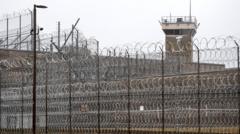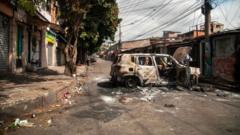Since the military takeover in 2021, Myanmar has spiraled into a nexus of crime, becoming the world's leading producer of opium and a base for various illegal activities that threaten regional stability and safety.
Myanmar's Surge as a Global Crime Hub: Unveiling the Dark Underbelly of a Nation at War

Myanmar's Surge as a Global Crime Hub: Unveiling the Dark Underbelly of a Nation at War
As Myanmar battles political unrest, it has unwittingly become a hotspot for criminal activities ranging from drug trafficking to cybercrime, impacting not just its own citizens but global markets.
The flower fields stretch across Shan State, presenting a deceptive beauty that hides the realities of a nation plagued by civil war and crime. In the backdrop of these vibrant blooms lies an alarming reality: Myanmar now holds the title of the world's largest exporter of opium, crucial for heroin and other narcotics. This situation is a direct result of the country's descent into chaos after the military coup of 2021, which ousted the elected government, leading to a significant upsurge in organized crime.
From arms deals to human trafficking and illegal logging, Myanmar is becoming a playground for criminal syndicates, notably from neighboring China. The Global Organized Crime Index identifies Myanmar as a critical nexus of transnational crime, with its impact resonating throughout Southeast Asia. The flourishing illicit economy feeds the adversities faced by over 55 million Myanmar citizens, further destabilizing a nation already struggling to find peace.
As Myanmar grapples with its identity amidst overlapping wars, the country is becoming synonymous with the darker aspects of society: drug use, exploitation, and corruption. The beauty of its landscapes stands in stark contrast to the increasing visibility of crime syndicates that thrive in its shadows. In a rapidly changing world, Myanmar's journey into the depths of organized crime may prove to be a cautionary tale of how political strife can yield a fertile ground for unlawful activities, with ramifications felt far beyond its borders.
From arms deals to human trafficking and illegal logging, Myanmar is becoming a playground for criminal syndicates, notably from neighboring China. The Global Organized Crime Index identifies Myanmar as a critical nexus of transnational crime, with its impact resonating throughout Southeast Asia. The flourishing illicit economy feeds the adversities faced by over 55 million Myanmar citizens, further destabilizing a nation already struggling to find peace.
As Myanmar grapples with its identity amidst overlapping wars, the country is becoming synonymous with the darker aspects of society: drug use, exploitation, and corruption. The beauty of its landscapes stands in stark contrast to the increasing visibility of crime syndicates that thrive in its shadows. In a rapidly changing world, Myanmar's journey into the depths of organized crime may prove to be a cautionary tale of how political strife can yield a fertile ground for unlawful activities, with ramifications felt far beyond its borders.





















